What would Jacob do? (a story to think about baptism)
There is a long and beautiful biblical tradition of exploring ideas through stories. From Samuel’s “you are the man†hypothetical that he uses to confront King David in 2 Samuel 12, to the parables of Jesus, stories have always been used to draw people in and help them think about how spiritual beliefs might play out in the real world.
This is a story I have written to try to explore how I think about baptism and whether or not Christians should baptise their kids. The question that is left hanging at the end will answer for me whether I sit more comfortably in the credobaptist or pedobaptist position. It may or may not help you also if you are thinking through this issue. Either way, I hope you like it.
WHAT WOULD JACOB DO?
Jacob loved and followed Yahweh, the God of his ancestors, all the days of his life. His parents poured the scriptures into his heart from the moment they held him in their arms. He can not remember a time that he had not had the promises of God, the stories of God’s great works and the songs of the psalms filling his ears and mind. He knew the prophets as well, and longed for the day that the promised Messiah would come to establish God’s kingdom and bring the great shalom that this world so desperately needed.
Now in his late 20s, Jacob was a father himself. Sadly, his wife had died giving birth to their first daughter Mariah, but Jacob had promised her that he would pour the scriptures into the heart of their daughter in the same way that it had been poured into him. As Jacob has learnt from Deuteronomy, Yahweh wanted him to do just that… “Fix these words of mine in your hearts and minds; tie them as symbols on your hands and bind them on your foreheads. Teach them to your children, talking about them when you sit at home and when you walk along the road, when you lie down and when you get up.†(Deuteronomy 11:18-19)
And so that is what Jacob did. Every day, he sang to Mariah the psalms he knew, told her the stories of God’s great acts of salvation and reminded her of the promise that God’s Messiah would one day be sent and that they should be ready. “Yahweh has made a promise, little Mariah,†he would say to her. “And when our Lord makes a promise, he never breaks it. You will see. The Messiah will come and make all things right again and like our father David, we will dwell in the house of the Lord forever.â€
—————————–
Now, Jacob lived with his daughter in a fairly isolated village and although he had relatives in Jerusalem, he rarely visited them. Consequently, he knew little of the great events that had taken place there only a few weeks earlier. Over the last couple of years, he had heard rumours about the Nazarene man, Jesus, and his claims to be the Messiah, but he had never seen him and so didn’t give him too much thought. There had been people claiming to be the Messiah before Jesus and there were sure to be ones after as well. Also, the latest rumours were that this Jesus had now been arrested and killed by the authorities for being a trouble-maker and so any hopes that God’s promises were now being fulfilled were put to rest in Jacob’s mind.
As Mariah had been sick, Jacob had not been able to travel to Jerusalem to celebrate the Passover meal with his relatives there. Fortunately now she was better and so he decided to make the belated journey for the feast of Shavuot.
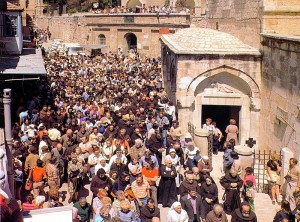 As he travelled through Jerusalem, with Mariah strapped to his back, he marvelled at the crowds of people from all walks of life. The sounds of different languages buying, selling and trading, the interesting colours of clothing and the smells of food and animals were an exciting feast for the senses.
As he travelled through Jerusalem, with Mariah strapped to his back, he marvelled at the crowds of people from all walks of life. The sounds of different languages buying, selling and trading, the interesting colours of clothing and the smells of food and animals were an exciting feast for the senses.
He had not gotten too far, when suddenly out of nowhere, the sound of a great wind came racing through the streets. It started off as a whispering breeze, but eventually thundered as a gale that raced past the crowds of people and disappeared around a building. Everyone ducked to the ground and Jacob reached for his daughter to shield her from the roar of the tempest. After it had gone, everyone stood up slowly, stunned and confused as to what had just happened. People began talking amongst themselves and it didn’t take long for people to follow where the wind had gone. The trickle of curious people became a river as the crowd moved down the dusty road, everyone chatting away in their own tongue about what it could mean. Was there a dust storm on its way? Why did the wind travel in such a curious manner? Where was it going? And is it crazy to even think that wind could be “going†anywhere?
Jacob checked that his daughter Mariah was ok before joining the swarm of people as it moved down the street, following the path of the wind. As they turned the corner, Jacob could hear people shouting praises to Yahweh and speaking of the Nazarene Jesus. This confused Jacob as he thought all interest in Jesus was as dead and buried as Jesus was himself, but what was even more confusing was the discussion that began to spread through the crowd. Somehow, it seemed, everyone could understand what these men were saying as if they were speaking in their own language! Amazed and bewildered, the crowd started to realise that something supernatural was happening. A stranger, standing next to Jacob looked at him and said, “What does this mean?†“I don’t know.†Jacob replied, “But the Spirit of Yahweh is at work here!â€
As he said this, a couple of sceptical men stood up on a cart and began making fun of the men who were praising God. “Ahh, stop your crazy yelling!†they hollered mockingly, and then turning to the crowd they said, “Let’s get out of here. These men are clearly just drunk.â€
Then one of the men who had been praising God motioned for his friends to stop. He climbed up on a ledge so that he could address the crowd. “Fellow Jews†he began, “and all of you who live in Jerusalem, let me explain this to you… listen carefully to what I say.â€
His voice boomed with a sense of earnestness and strength, and Jacob hushed those who stood near him so that he could hear what the man was about to say…
—————————–
“These people are not drunk, as you suppose. It’s only nine in the morning! No, this is what was spoken by the prophet Joel: ‘In the last days, God says, I will pour out my Spirit on all people. Your sons and daughters will prophesy, your young men will see visions, your old men will dream dreams. Even on my servants, both men and women, I will pour out my Spirit in those days, and they will prophesy. I will show wonders in the heavens above and signs on the earth below, blood and fire and billows of smoke. The sun will be turned to darkness and the moon to blood before the coming of the great and glorious day of Yahweh. And everyone who calls on the name of the Lord will be saved.’
 “Fellow Israelites, listen to this: Jesus of Nazareth was a man accredited by God to you by miracles, wonders and signs, which God did among you through him, as you yourselves know. This man was handed over to you by God’s deliberate plan and foreknowledge; and you, with the help of wicked men, put him to death by nailing him to the cross. But God raised him from the dead, freeing him from the agony of death, because it was impossible for death to keep its hold on him. David said about him: ‘I saw the Lord always before me. Because he is at my right hand, I will not be shaken. Therefore my heart is glad and my tongue rejoices; my body also will rest in hope, because you will not abandon me to the realm of the dead, you will not let your holy one see decay. You have made known to me the paths of life; you will fill me with joy in your presence.’
“Fellow Israelites, I can tell you confidently that the patriarch David died and was buried, and his tomb is here to this day. But he was a prophet and knew that God had promised him on oath that he would place one of his descendants on his throne. Seeing what was to come, he spoke of the resurrection of the Messiah, that he was not abandoned to the realm of the dead, nor did his body see decay. God has raised this Jesus to life, and we are all witnesses of it. Exalted to the right hand of God, he has received from the Father the promised Holy Spirit and has poured out what you now see and hear. For David did not ascend to heaven, and yet he said, ‘The Lord said to my Lord: “Sit at my right hand until I make your enemies a footstool for your feet.â€â€™
“Therefore let all Israel be assured of this: God has made this Jesus, whom you crucified, both Lord and Messiah!â€
—————————–
This last word, “Messiahâ€, rang out and echoed across the crowd as everyone stood in stunned silence. For Jacob, this word cut straight through to his heart and rested there like a seed falling on good soil. God opened Jacob’s heart so that he could receive this word and all at once Jacob knew it was true.
“Mariah! Mariah!†he cried, taking his daughter out of her sling and holding her up to his beaming face, “Jesus is the Messiah! Jesus is the Messiah!†Jacob’s heart filled with joy as he realised that all the promises, all the stories, all the songs and prophesies had finally come to pass! The Messiah that he had longed for and spoke to his daughter about every day, had finally come and his name was… Jesus.
People in the crowd were responding in a variety of ways. Some scoffed and walked away, some were debating passionately amongst themselves, and others were pushing forward, wanting to speak to the man who had made the speech. Jacob was one of this last group and he moved through the crowd, his daughter in his arms and his mind racing. So Jesus was the Messiah. Now what? What should we do now? God’s Spirit was poured out on these people. What does that mean? How do I receive this? And how could I? These and many more questions raced through his mind, but instead of doubt or fear holding him back, the joyful opportunity to embrace the Messiah compelled him forward.
When he finally reach the front of the crowd he stepped forward and knelt before the men, holding Mariah close to his heart that was racing in his chest. “Brothers,†he asked them earnestly, “What shall we do?â€
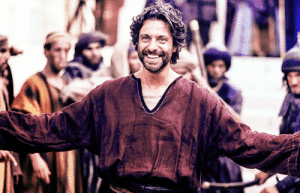 The man who had spoken earlier, who people nearby were calling Cephas, looked at Jacob and smiled. He then looked around to all those who were standing there wondering the same thing and invited them with joy, “Repent and be baptised, every one of you, in the name of Jesus Christ for the forgiveness of your sins. And you will receive the gift of the Holy Spirit! The promise is for you and your children and for all who are far off—for all whom Yahweh our God will call.â€
The man who had spoken earlier, who people nearby were calling Cephas, looked at Jacob and smiled. He then looked around to all those who were standing there wondering the same thing and invited them with joy, “Repent and be baptised, every one of you, in the name of Jesus Christ for the forgiveness of your sins. And you will receive the gift of the Holy Spirit! The promise is for you and your children and for all who are far off—for all whom Yahweh our God will call.â€
For all whom Yahweh our God will call. Jacob looked down at his daughter Mariah and whispered to her, “Mariah, that is us. Yahweh is calling us to follow the Messiah Jesus.†Mariah, looked up at her dad, squinting in the sunlight and looking around at all the sights and sounds that she wasn’t used to in their small village. Jacob knew Mariah had no idea of the significance of this day, but he also knew they were forever changed. They had always been a family who worshipped Yahweh, but now Yahweh had sent his Messiah and nothing would ever be the same.
For a few moments Jacob was lost in thought, staring into his daughter’s face and wishing his wife could have been there with them this day. When he looked up, the man Cephas had climbed back up onto the ledge, trying to appeal to those in the crowd that were still unconvinced or had began to walk away. He pleaded with them, “Save yourselves from this corrupt generation!†Some stayed to hear more, some left shaking their head, but a large portion of the crowd, like Jacob, had heard Yahweh’s call and wanted to respond.
—————————–
They journeyed to the edge of the city where a spring of water formed large pools. The men who had led them there waded into the water and began to baptise those who had accepted Cephas’ message about Jesus. Jacob stood at the edge of one of the pools, as person after person stepped forward to accept Jesus as the Messiah. They each went in differently. Some joyfully, some solemnly. Some with a weary heart and some singing psalms of salvation.
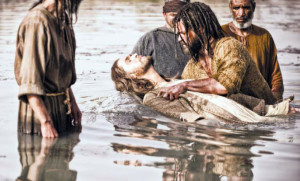 Jacob watched them wade in and watched them wade out and he thought about what this beautiful ritual meant. The water of these springs was not magical, but they were powerfully symbolic and it evoked for Jacob the many images of water throughout the Scriptures – The waters of creation, the great flood, the parting of the Red Sea, the waters used in ritual cleansing. It reminded him of God’s promises spoken by the prophet Ezekiel: “I will sprinkle clean water on you, and you will be clean; I will cleanse you from all your impurities and from all your idols. I will give you a new heart and put a new spirit in you; I will remove from you your heart of stone and give you a heart of flesh. And I will put my Spirit in you and move you to follow my decrees and be careful to keep my laws. Then you will live in the land I gave your ancestors; you will be my people, and I will be your God.â€Â (Ezekiel 36:25-28). In this simple ritual, all of these promises and images were being embraced as being fulfilled, just as much as Jesus was being embraced as the Messiah.
Jacob watched them wade in and watched them wade out and he thought about what this beautiful ritual meant. The water of these springs was not magical, but they were powerfully symbolic and it evoked for Jacob the many images of water throughout the Scriptures – The waters of creation, the great flood, the parting of the Red Sea, the waters used in ritual cleansing. It reminded him of God’s promises spoken by the prophet Ezekiel: “I will sprinkle clean water on you, and you will be clean; I will cleanse you from all your impurities and from all your idols. I will give you a new heart and put a new spirit in you; I will remove from you your heart of stone and give you a heart of flesh. And I will put my Spirit in you and move you to follow my decrees and be careful to keep my laws. Then you will live in the land I gave your ancestors; you will be my people, and I will be your God.â€Â (Ezekiel 36:25-28). In this simple ritual, all of these promises and images were being embraced as being fulfilled, just as much as Jesus was being embraced as the Messiah.
As Jacob watched the crowd filing in to be baptised, waiting for his turn, he also noticed an interesting thing. Some waded into the pools with their young children in their arms. There were even some whole families with infants who came forward to be baptised. But Jacob noticed that others didn’t take their children. Jacob saw one man who had just come out of the pool after his baptism, go to his wife, take their baby from her arms and then she went in to be baptised.
This perplexed Jacob and made him wonder, when it came to his turn, what he should do. Should both he and his daughter be baptised together, signifying that Jesus was their Messiah and they would follow and love him as they had followed and loved Yahweh? Responding to Jesus as the Messiah seemed to him the most natural thing for a Jew. If only he was baptised, would that mean that his daughter and he were separated in a way that they had never been? Would it mean she was no longer a Jew? Or that he wasn’t?
But on the other hand, should he only be baptised, to signify that he had received the forgiveness and cleansing that the Messiah offered. He could tell God had moved his heart to respond and although he knew the call went out to his daughter as well, it was he who was consciously responding to it. If little Mariah was baptised, what would it mean? Would it be meaningless? Would it be a lie? Would it be offensive to Yahweh? Or would it be the right response for a Jewish family embracing the Messiah? In fact, would it be offensive to Yahweh if he did not baptise her?
His head was filled with questions and confusion. In his arms, Mariah began to cry. As Jacob calmed his daughter he thought to himself, “This is ridiculous! Today is a day of good news! Where has my joy gone? A moment ago I was in awe that Yahweh had fulfilled his promises and shown my family such kindness, and now, I am stressed about causing him offence?†Then he prayed this prayer, “O Lord, please forgive my lack of faith in your compassion. Some people are taking their children with them to be baptised and some people are not. I am not sure of your will. Help me make the right choice with joy in this great day.â€
When Jacob opened his eyes, it was his turn to step into the pool.
And so, Jacob stepped forward his daughter in his arms…
I looked at Jacob as he waded through the water, towards the apostle James who stood in the middle of the deep pool. James was smiling and speaking to all those who came forward briefly before baptising them in the name of the Father and of the Son and of the Holy Spirit, just as Jesus had commanded. I was very curious to see what Jacob would do when he reached the front of the line, but suddenly, my view was blocked. At first I was frustrated, but I couldn’t stay that way. Stepping in front of me was a group of newly baptised converts, dripping wet and singing praises to the Messiah with laughter and tears and dancing and joy. “God has made Jesus both Lord and Messiah!†they cried, echoing the words Cephas had spoken to the crowd earlier. I looked around at the crowd that was full of others doing the same – praising God and declaring the gospel. All those who had accepted this message were baptised, and about three thousand were added to their number that day.
They devoted themselves to the apostles’ teaching and to fellowship, to the breaking of bread and to prayer. Everyone was filled with awe at the many wonders and signs performed by the apostles. All the believers were together and had everything in common. They sold property and possessions to give to anyone who had need. Every day they continued to meet together in the temple courts. They broke bread in their homes and ate together with glad and sincere hearts, praising God and enjoying the favor of all the people. And the Lord added to their number daily those who were being saved.
—————————–
This story was inspired by the record of the events on the Day of Pentecost,
which you can read for yourself in Acts 2.
(2605)
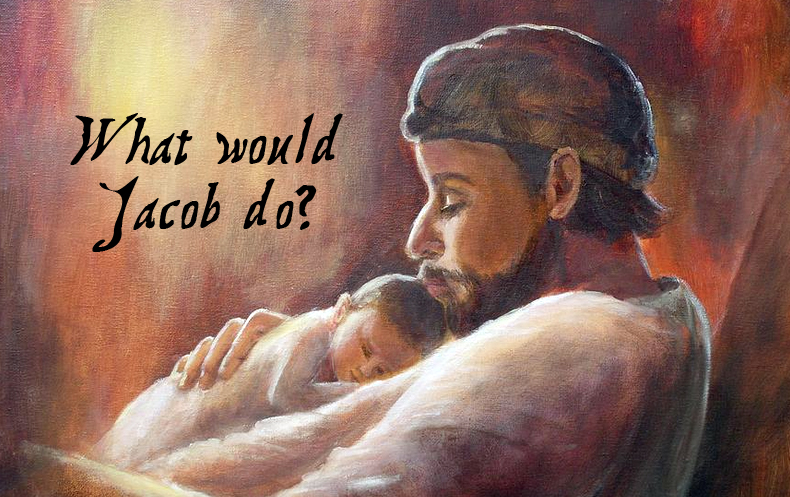
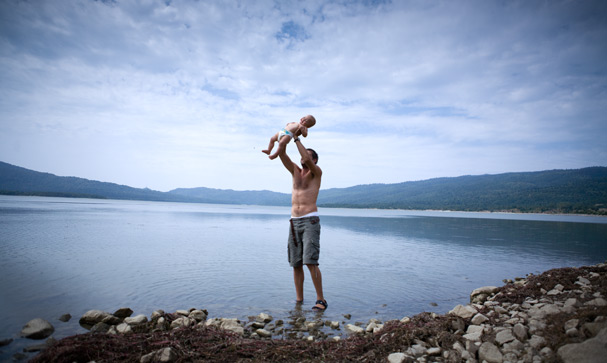

Hi Simon! I love reading stories, and we have been grappling with baptism too – we are parents of two little ones and have attended churches belonging to five denominations. It is interesting to hear your perspective more in what you didn’t say than what you did.
Interesting. Can you elaborate?